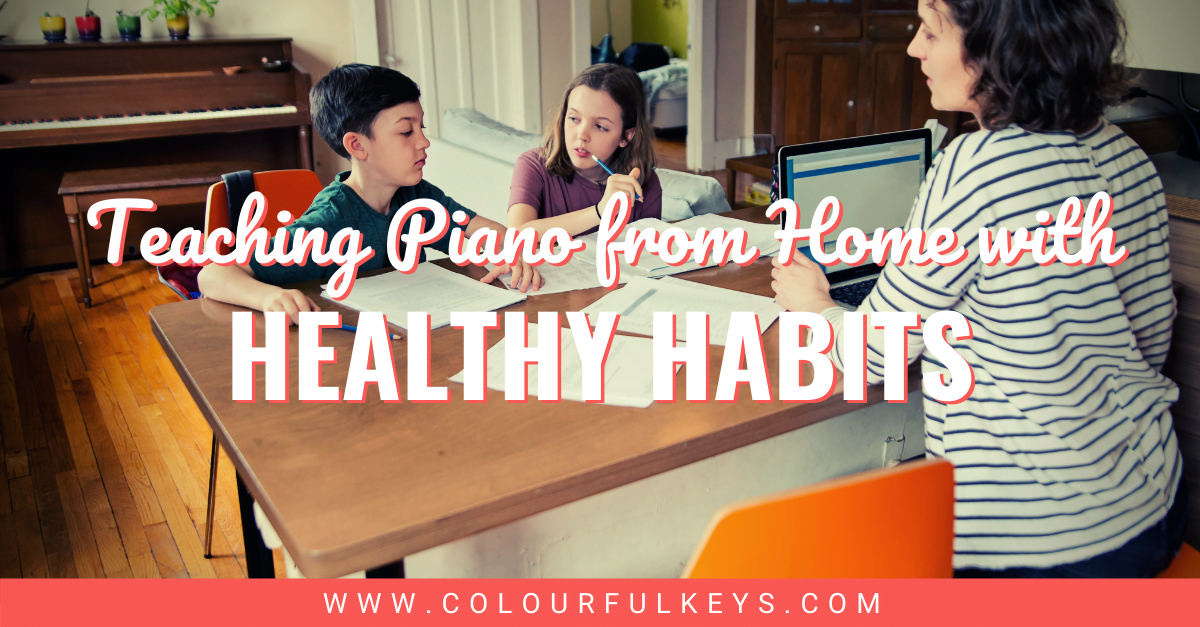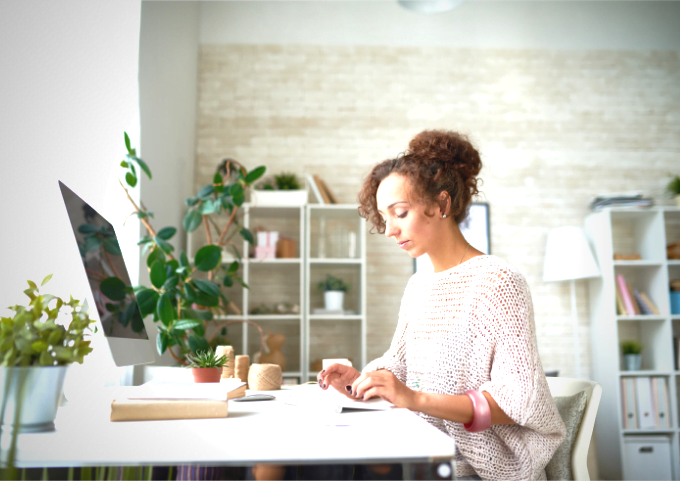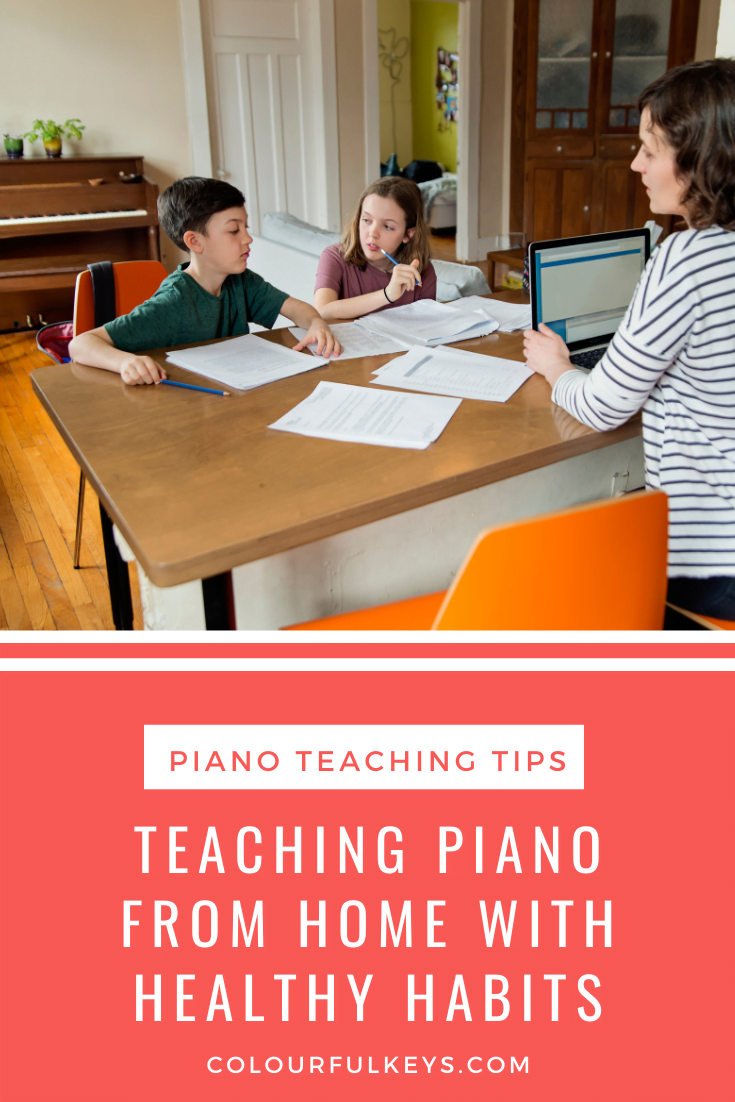Teaching piano lessons from your home is wonderful in many ways. But it can also be challenging when you work and live in one space. Here are some solutions to help you keep the balance, stay zen and develop healthy habits for your home piano studio.

⬆️ Listen to the podcast above or keep on reading, whichever fits your style. ↙️
You might start teaching piano lessons from home at the very start of your teaching career. Or sometimes, you may teach at students’ homes or as part of a larger music school for a few years before branching out on your own.
Whatever your stage, teaching piano lessons in your home can be a very good option. You won’t have to pay any rent and your commute to work should only be a few metres! Yippee! 😆
But teaching music lessons in your home are not without its challenges.
Many teachers work from home to save money on studio space rental or to save time travelling to and from students’ houses. But once your home starts pulling double-duty as a music school, the line between business and personal can feel blurry.
Follow these tips to develop healthy habits from the get-go.
Setting Business Boundaries
Having strong boundaries will help you to teach more effectively and preserve your life-balance.
Business Hours
This one will creep up on you if you’re not careful. In the beginning, you’ll only have a couple of students and it’ll seem fine to answer their texts while watching TV in the evening and take their calls while on your Sunday walks.
Don’t fall into this trap.
It isn’t a big deal when you have a few students and you’re just starting out. But it will get old fast. And the habits you train now will last as long as they stay in your studio…which will hopefully be for a long time.
Set business hours for your communication and admin work.
Then stick to them.
Physical Space
Even if it’s just a desk in your living room, creating a separate space for work really helps create boundaries when you’re teaching in a home music studio.

I know how it is when you’re teaching from your living space. I did that for about 10 years before I was able to have a separate room just for teaching.
When your living space is multi-purpose, it’s extra important that you define what is and is not teaching stuff. Instead of keeping some of your books over one side, some teaching trinkets on another shelf and your piano in a third corner, try to put it all together. That way you can “leave” your teaching area at the end of the day and not be so distracted by all the work stuff still surrounding you.

BECOME A BETTER MUSIC TEACHER.
HAVE MORE FUN.
Get the resources and support you need to teach confidently and feel fulfilled in our Vibrant Music Teaching membership.
Routine
Routines are great for creating habits for yourself and those around you.
If you’re used to a commute, try transitioning from your ‘home life’ to your ‘work life’ each day by simply creating a fake commute for yourself. When it’s time to start your working day, go for a quick walk around the block and come back in. When it’s time to end, do the same thing.
These kinds of rituals might seem silly, but they can be a great signal for your brain to switch from one mode to another if you are teaching in a home music studio.
Need more help dealing with the business side of your music teaching studio? I have an entire hub page devoted to that.
Taking Time Off
Piano teaching is intensive. We (teachers and students alike) do need time to recharge batteries. Taking time off is not selfish or indulgent. It’s an investment in your teaching career, because it will help you avoid burnout.
Calendar Your Holidays
Make a calendar for your studio, even if you only have 1 student.
It doesn’t need to be fancy. Just a simple Excel, Google or Canva template will do. Mark in the weeks your studio will be closed and any special events you’re planning like recitals or group workshops.

Having this calendar to refer to will make you take your business more seriously and thus your students/parents will too.
Flex Days
I also recommend implementing some kind of system for holidays and sick leave. I describe my own process in this article.
Whether you use that or another system, make sure you have something so you’re not pushing yourself to work no matter what.
Self-Care When Teaching Music Lessons from Home
If you’re teaching piano from home, YOU are your business. So, looking after yourself = taking your business seriously.
If you aren’t healthy, you can’t make any money. Take the time for self-care right from the start.
Exercise
It’s lovely not to have a commute.
Back when I worked in an office, I absolutely did not enjoy cycling there at 7:30 am each day and cycling home after dark. But it did give me guaranteed exercise. 😅

When you’re teaching music lessons from home, you’re going to need to make a conscious effort to get out and about. It’s simply not built into our routines.
Make a plan to do some kind of exercise you enjoy every day, and make a plan to get out of your house too. (Those might be the same thing if you love going for walks around your local park!)
Teacher Snacks
Teaching is tiring work. Until you start working with several students, you might not realise quite how draining it can be.
Having a few snacks on hand will keep you fueled. But if you’re not careful, you might start scarfing chocolate between each student just to keep the energy up.
Each and every student deserves you at your best. So, look after yourself and choose your healthy snacks carefully.
What are some strategies you use to stay sane whilst teaching from home?
I’d love to hear your thoughts on this in the comments below. 🙂

I schedule nap breaks. I find I have to!
Really great common sense tips that are easy to implement, great article.